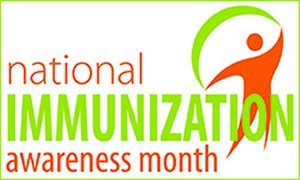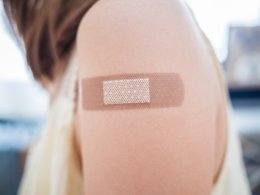 According to a recent article in MD Magazine, scientists at a private research company have made significant progress toward the development of an oral flu vaccine. As stated in the article, the researchers at Vaxart, Inc., “have found that an oral tablet for influenza vaccination can protect against infection just as well as – if not better than – a commercial injectable quadrivalent influenza vaccine.”
According to a recent article in MD Magazine, scientists at a private research company have made significant progress toward the development of an oral flu vaccine. As stated in the article, the researchers at Vaxart, Inc., “have found that an oral tablet for influenza vaccination can protect against infection just as well as – if not better than – a commercial injectable quadrivalent influenza vaccine.”
The oral flu vaccine recently underwent Phase 2 clinical trials, reportedly with very favorable results. MD Magazine reports that: Continue reading

 Each month, the Centers for Disease Control and Prevention (CDC) publish a newsletter highlighting recent news and updates in the world of immunizations. The CDC provides this newsletter, titled Immunization Works, to “national health care provider and consumer groups for distribution to their members and constituencies.” However, it is also
Each month, the Centers for Disease Control and Prevention (CDC) publish a newsletter highlighting recent news and updates in the world of immunizations. The CDC provides this newsletter, titled Immunization Works, to “national health care provider and consumer groups for distribution to their members and constituencies.” However, it is also  According to a
According to a  August is National Immunization Awareness Month. Sponsored by the National Public Health Information Coalition (NPHIC) and supported by the Centers for Disease Control and Prevention (CDC), National Immunization Awareness Month is intended to help “promote the importance of immunizations,” and spread accurate information about the safety and risk factors associated with all types of CDC-recommended vaccinations.
August is National Immunization Awareness Month. Sponsored by the National Public Health Information Coalition (NPHIC) and supported by the Centers for Disease Control and Prevention (CDC), National Immunization Awareness Month is intended to help “promote the importance of immunizations,” and spread accurate information about the safety and risk factors associated with all types of CDC-recommended vaccinations.  While vaccinations are routine procedures that carry strong recommendations from the Centers for Disease Control and Prevention (CDC), they still carry certain risks. Flu shots, tetanus shots, and other CDC-recommended vaccinations are known to cause a variety of injuries and illnesses, and errors during the vaccine administration process can lead to various types of painful and debilitating shoulder injuries.
While vaccinations are routine procedures that carry strong recommendations from the Centers for Disease Control and Prevention (CDC), they still carry certain risks. Flu shots, tetanus shots, and other CDC-recommended vaccinations are known to cause a variety of injuries and illnesses, and errors during the vaccine administration process can lead to various types of painful and debilitating shoulder injuries.  Although the Centers for Disease Control and Prevention (CDC) recommends vaccination as the best way to prevent the spread of the flu and other diseases, it also says that certain people should not get vaccinated. Since not getting vaccinated carries obvious risks, anyone who has questions about whether it is safe to receive a particular vaccination should consult their doctor.
Although the Centers for Disease Control and Prevention (CDC) recommends vaccination as the best way to prevent the spread of the flu and other diseases, it also says that certain people should not get vaccinated. Since not getting vaccinated carries obvious risks, anyone who has questions about whether it is safe to receive a particular vaccination should consult their doctor. Experiencing pain or an illness following vaccination can be frightening. Whether it’s you or a family member, knowing what to do – and where to turn for help – can be a challenge.
Experiencing pain or an illness following vaccination can be frightening. Whether it’s you or a family member, knowing what to do – and where to turn for help – can be a challenge. In the United States, measles has largely been eradicated thanks to the introduction of the measles, mumps and rubella (MMR) vaccine in 1971. The MMR vaccine is typically administered in a series of two doses; and, according to the
In the United States, measles has largely been eradicated thanks to the introduction of the measles, mumps and rubella (MMR) vaccine in 1971. The MMR vaccine is typically administered in a series of two doses; and, according to the